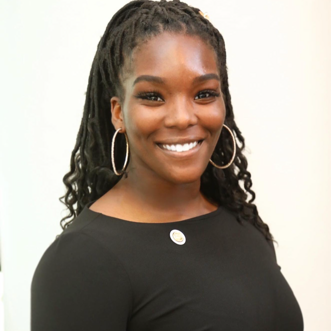Student Spotlight: Brianna Tate

April 11, 2022
Brianna Tate is a doctoral candidate in animal science from Greensboro, North Carolina. She attended Appalachian State University as an undergraduate and now studies the development of novel nutritional methods to bolster dairy calf immunity. Tate is a 2022 Bouchet Scholar.
What is your area of research and why is it important?
My area of research pertains to developing novel nutritional methods to bolster dairy calf immunity during the early weeks of life. During this time, dairy calves are highly susceptible to disease due to their naïve immune systems and deficient immune cell responses. As a result, there is a high incidence of calf mortality and morbidity that can negatively impact a calf’s growth and productivity later in life. The development of non-antibiotic therapies that enhance calf immunity allows for the reduction of on-farm calf-rearing costs and disease-related losses, as well as overall enhanced dairy calf welfare.
What are the larger implications of this research and what is its impact?
The development of non-antibiotic therapies that can confer immune protection in calves can save the dairy industry a lot of money in the form of reduced veterinary/calf-rearing costs as well as potentially increased reproductive success and milk production. This in turn allows for more efficacious dairy production in order to feed an ever-growing world population. Additionally, discoveries of nutritional methods to enhance neonatal dairy calf health can also translate into other areas of immunology and health, potentially aiding in the development of therapies that could improve the health of other production animals or even humans.
What does it mean to you to be a Bouchet Scholar?
To me, being a Bouchet scholar means embodying the intersectionality of academic excellence and advocacy. I think often in academia, so much emphasis is placed on the former while overlooking the latter. A Bouchet scholar, in my opinion, strives to transcend that divide and is intentional in establishing and expanding the much-needed space that diversity, equity, and inclusion must have within academic spheres. As a Bouchet scholar, I hope to serve as both a role model and an agent of change, working toward improving the progressive assimilation of diversity and inclusion efforts within the culture of academia and beyond.
How do you exemplify the five pillars of the Bouchet Society – character, leadership, advocacy, scholarship and service?
Throughout my graduate studies, advocacy, scholarship, and service have always been important facets of my academic career. I consistently sought positions of leadership or involvement in initiatives that allow me to interact with and support marginalized communities and youth. Through such opportunities, I have been able to push initiatives within my department that have allowed for increased diversity and inclusion efforts in that space as well as mentor students of underrepresented backgrounds and aid them in their pursuit of higher education. These are passions of mine as I strive to leverage the positions afforded me to pave the way for the future generation of young scientists.
What are your hobbies or interests outside of your research or scholarship?
Because my career and research are so heavily science-laden, I’ve found great joy in engaging in artistic forms of expression. All my life drawing and painting have been almost therapeutic for me and I continue to try to incorporate them into my daily life as a means of “escaping” from academia once in a while. Reading and writing fantasy and science fiction stories is also a passion of mine. I also love taking my dog, Jakobe, on long walks with me on the East Ithaca Recreation trail.
Why did you choose Cornell to pursue your degree?
I chose Cornell primarily because of the prestige of the field of animal science here and the type and level of research that takes place there within. The science and discoveries generated within the department here are world-renowned and highly impactful and I knew that the guidance and training I would receive would equip me with the tools I’d need to become a high-producing successful scientist within my field.
